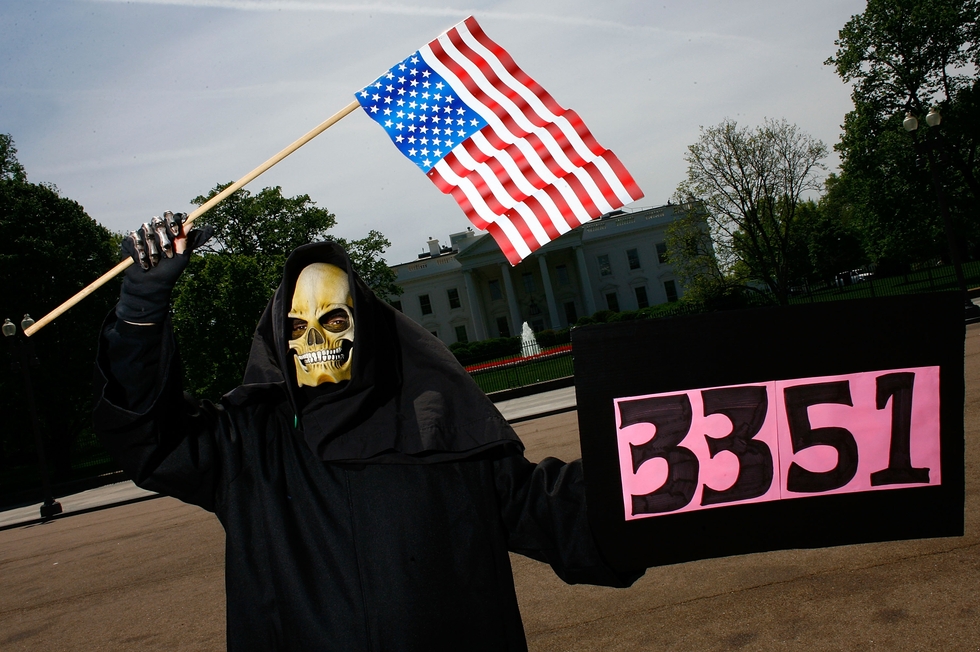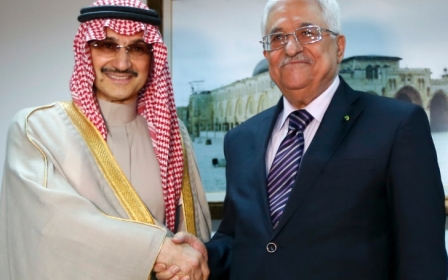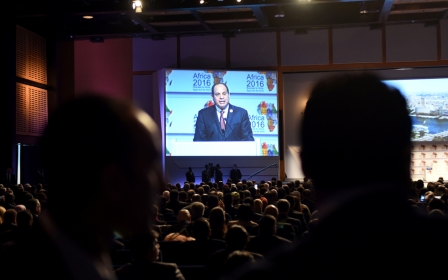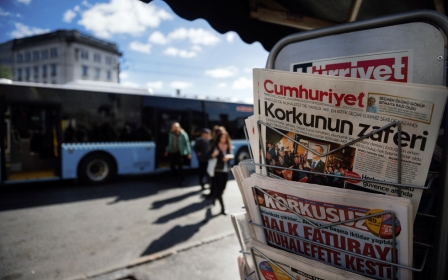Self-deception: The Arab rulers' gift to the West

In the days before the fall of Baghdad on 8 April 2003, the Iraqi minister of information would boast, in his daily press appearances, about how the Iraqis were defeating the Americans and the British.
Muhammad Saeed al-Sahhaf’s rosy depiction of his army’s performance - in what was clearly a one-sided war - continued to escalate even as the army melted away and the American tanks began to cruise unimpeded into the heart of the city.
The minister of (mis)information’s extreme style of self-deception was not unprecedented in its environment. Turning crashing military defeats on the ground into momentous rhetorical victories on the airwaves was an area of expertise perfected by Arab nationalist media in a number of Arab states.
The most blatant was the case of Egypt in June of 1967. Although the Egyptian air force was wiped out in the first hours of the war and its ground divisions were executing a hasty, chaotic and tactically catastrophic retreat across the Sinai desert, on the Egyptian airwaves a different story was unfolding. The Egyptian army was pushing deep inside Israel and was only hours away from taking the Israeli capital, Tel Aviv.
This Arab nationalist self-deception was pervasive, and not simply restricted to matters of war. It affected almost all spheres of public life, such that nothing reported in the official media could ever be trusted. Egypt’s cure-for-all Kofta and flying cars are some of the most recent examples.
This Arab nationalist trade has ceased to be simply a local brand. It has become externally contagious. Because it inherited the British Empire’s position and possessions in the Middle East, and because it has grown more enmeshed in the politics of the region, America naturally contracted this strand of Arab nationalist self-deception. And it seems that the American invasion of Iraq provided the most impactful contact.
Bush's fake victory
Little over one month after the invasion, President George W Bush declared his war a “mission accomplished,” even though the head of the Iraqi regime and some of his key advisors were still at large. More ironic, the statement was also issued at a time when the vacuum left by the Iraqi state apparatus was clearly being filled by the allies of Iran, a country that Bush had named a member of his Axis of Evil.
This would mark the beginning of a lasting state of denial. Between the winter of 2004 and spring of 2005 when the insurgency was on the rise, challenging not simply the rosy image of a war of liberation, but also putting at risk the entire political process the Americans have placed in motion, Bush administration officials would exhaust all their rhetorical skills to purport that the insurgency was desperate and, in any case, on its last throes.
These statements of course contradicted facts on the ground. Not only were American soldiers falling on the battlefield in growing numbers, but their armoured vehicles proved ill-prepared to handle the insurgent’s weapon of choice: improvised explosive devices. This had further implications. Supplying military bases and divisions scattered across Iraq became, as a consequence, a logistical nightmare.
That state of denial would become a key feature of the “war on terrorism”. There were many immediate victories to celebrate after every major operation, and many regrets later on as the disturbing rays of facts shone through the web of fabrications and fictions.
That culture of self-deception was not voted out of office with the Bush administration, despite President Barack Obama’s promise to bring greater transparency to Washington, DC. When Obama said that “we are the change we have been waiting for,” he was not playing with words. He was in fact truthful. The status quo became the anticipated change it promised to bring forth. In the "war on terrorism,” business proceeded as usual. Everyone in the political establishment was infected with this Arab nationalist disorder.
Calling this self-deception an Arab nationalist disorder is no orientalist trope. Arab politicians have no monopoly over lies. Politicians of every culture are generally fabricators and manipulators of “truths” for whatever grandiose ends they believe they are serving. But Arab nationalists have specialised in a unique brand of fabrications, which you could only master if you harbour two distinct traits: extreme self-contempt and far greater disregard for the people you represent.
While public scrutiny and democratic norms in the developed world cannot prevent leaders from entertaining the former, it traditionally forced them to harbour only the most minimum of the latter. Western leaders always feel vulnerable enough and, as a result, prefer to avoid the kind of embarrassment Arab rulers feel too insulated to worry about.
Leaders in the West could and often have lied to their people about their adventures abroad, projecting little shame and taking miniscule pain, when concocting pretexts to bomb other nations.
However, when it comes to immediate national interests, leaders are forced to act soberly. Local media typically play a pivotal role in mounting pressure on these leaders to remain on the defensive.
Contagion of deceit
That was at least the case before the contagion of Arab nationalist self-deception crept in. Ever since, Western leaders, especially the Americans, have grown comfortable lying to their own people, even about their most unmistakable defeats. To do so, they have resorted to the same dull tactics of self-mockery that their Arab nationalist inspirers invented. The current rhetoric surrounding the war with the Islamic State is quite instructive.
In their previous wars of rhetoric with Israel, Arab rulers have portrayed the Israelis through their press as villains, a band of gangsters, who if left alone would self-destruct. They would murder, rape, and torture their own. This enemy has no purpose in life, no ethical code, nor taboos, and nothing to observe beyond fluctuating, whimsical and criminal minds.
Such vilification only damaged the Arabs; never the Israelis. The Arab rulers may have believed the lies they concocted, but on the ground that amounted to nothing.
Stranger still, the notable aspect of this strand of self-mockery is its ability to spread and endure.
Although the Israelis showed considerable organisational resilience and dedication at every encounter, and their Arab rivals nothing but the lack of both, the Arab masses have only recently begun to question the image their medias drew of their enemy.
'Misunderestimating' ISIS
In the current conflict with the Islamic State, the American leaders are engaged in the same self-deceit. In the current environment, where the war is handled through unmanned planes, and where the few soldiers involved remain far from harm’s ways, Western politicians can afford to lie indefinitely.
Through a growing complacent press, desperate and misguided cyber warfare, and through the media of their Arab allies, the Americans project Islamic State fighters as bloodthirsty barbarians, with no purpose, no ethics and no sense of identity.
But there is more to IS in this portrayal: its savagery masks its infirmity. Beyond the cruelty of IS beheadings and suicide bombers, the American media remind us that there are frail characters, complaining about how the slow Internet connectivity in Raqqa renders a herculean task uploading the images of Nutella and kittens necessary to lure impressionable blonde brides.
In the Arab press - a mere extension of the American press in the current conflict - IS is always splintering, sometimes because a contingent of these buffoons was not happy over the way in which sex-slaves were distributed. At other times, we are told that IS is on the verge of financial collapse because on the one hand many of its trusted Zakat - or tax - collectors have absconded with millions of dollars, and because on the other hand hundreds of millions of its reserve of US dollars were blown into smoke by well-targeted air strikes.
If added to reports that tens of thousands of IS soldiers have been blown to smithereens, one can only wonder what is left of IS to counter a coalition of 60 countries, including the most powerful nation on earth.
Yet the Islamic State group persists, both as reality and as a currency of fear-mongering. To mask the humiliation of the failure to defeat such a meaningless adversary, the public is led to believe that thousands of fresh recruits are joining IS every year.
It's the money
To explain why these recruits keep pouring in despite all the bombings around them and the air-tight blockade on the group, IS’ never-ending stream of cash is invoked. Viewers are made to believe that people leaving the UK, USA, France, Belgium, Saudi Arabia and other generally well-to-do nations are doing so to earn a few hundreds of dollars in Syria.
This is by far one of American academics' favoured explanation of Islamic State’s appeal. It is almost the first factor you hear at any conference or symposium on IS. How exactly do these men plan to use their hard-earned cash in the Hereafter, after they carry out their suicide missions? That is a question no one asks. But mass-self deception thrives in the midst of brilliant academic minds that never ask questions.
To mask the fact that American intelligence agencies are quite in the dark about the capabilities of IS and the damage that has been done to it after tens of thousands of raids, the public is bombarded with silly news about the brutality of life under IS, not just for the usual victims: women, gays, lesbians, Sufis, and other minorities; but also for random casualties, such as woodpeckers and ibises.
As the public imaginary runs wild on this trivia of war, with all their exoticism and contradictions, the war itself - its cost, its lies, its violations of human rights and its rationales - escapes scrutiny.
- Ahmed Meiloud is a doctoral candidate at the School of Middle Eastern and North African Studies at the University of Arizona. His research interests include studying the various movements of political Islam across the Arab World, with special focus on the works of the thinkers, jurists and public intellectuals who shape the moderate strands of Islamism.
The views expressed in this article belong to the author and do not necessarily reflect the editorial policy of Middle East Eye.
Image: A protester dressed as the Grim Reaper holds a tally of US soldiers killed in Iraq while taking part in a protest with the group Americans United for Change during a rally to mark the fourth anniversary of President Bush's "Mission Accomplished" speech on 30 April, 2007 in Washington, DC. (AFP)
Middle East Eye propose une couverture et une analyse indépendantes et incomparables du Moyen-Orient, de l’Afrique du Nord et d’autres régions du monde. Pour en savoir plus sur la reprise de ce contenu et les frais qui s’appliquent, veuillez remplir ce formulaire [en anglais]. Pour en savoir plus sur MEE, cliquez ici [en anglais].





